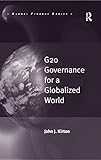G20 governance for a globalized world / by John J. Kirton. [Book] / John J. Kirton.
Material type: TextSeries: Global finance series | Global finance seriesPublication details: Farnham, Surrey ; Burlington, VT : Ashgate, c2013.Description: xv, 495 p. ; 24 cmISBN:
TextSeries: Global finance series | Global finance seriesPublication details: Farnham, Surrey ; Burlington, VT : Ashgate, c2013.Description: xv, 495 p. ; 24 cmISBN: - 9781409428299 (hardback : alk. paper)
- 9781409428305 (ebook : alk. paper)
- 337.1 23
- 337.1
| Item type | Current library | Call number | Status | Date due | Barcode | Item holds |
|---|---|---|---|---|---|---|
 Books
Books
|
Junaid Zaidi Library, COMSATS University Islamabad | 337.1 KIR-G (Browse shelf(Opens below)) | Available | 47744 |
Includes bibliographical references (p. [391]-426) and index.
Analyzing G20 governance -- Introduction -- The systemic hub model of G20 governance -- Generating the group, 1999-2001 -- Creating the G20, Berlin 1999 -- Governing globalization, Montreal 2000 -- Combating terrorism, Ottawa, 2001 -- Equalizing the influence, 2002-2007 -- Driving development, New Delhi 2002 and Morelia 2003 -- Bonding Berlin, 2004 -- Capturing China, Xianghe 2005 -- Strengthening sustainability, Melbourne 2006 and Kleinmond 2007 -- Creating the Summit Club, 2008-2010 -- Soaring to the summit, Washington 2008 -- Containing contraction, London 2009 -- Institutionalizing summitry, Pittsburgh 2009 -- Containing the Eurocrisis, Toronto 2010 -- Conclusion -- The future of G20 governance.
Systematically assesses the G20's emergence, evolution and performance in response to growing demands for global governance across a wide, interconnected policy agenda and the full set of governance functions that international institutions supply. This study mobilizes classic and contemporary international relations theory to explain the causes of observed G20 governance, and on this basis offers some concluding predictions about its future course. In particular it offers an account, grounded in the competitive dynamics among international institutions in a crowded world, rather than one based merely on the older model of forum-shopping among states in an anarchic system. This book does not take up the popular enterprise of advising G20 governors what they should do with their forum or criticizing them for not using it to quickly solve many of the world's problems. Nor is it a sanitized account from the inside. It focuses instead on systematically describing what the G20 did and explaining why it did it, using the best concepts and theories that scholars of international relations and global governance have in their analytic repertoire and that are relevant to the task at hand. Here it seeks not to test competing international relations theories with evidence from G20 governance, but to use the key concepts of the former to help provide a more disciplined and insightful account of the G20 itself.


There are no comments on this title.